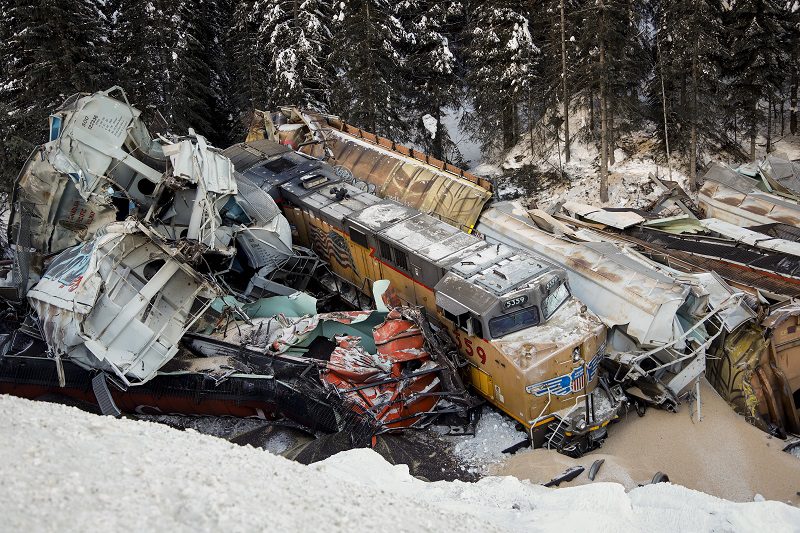Defendants deny claims of wrongdoing in fatal B.C. train derailment lawsuits

Defendants in lawsuits filed by families who lost loved ones in a British Columbia train derailment are denying any wrongdoing in the deaths of three Canadian Pacific Railway employees.
The derailment happened on Feb. 4, 2019, when 99 grain cars and two locomotives plummeted off a bridge near Field, B.C.
Families of two of the men killed filed separate lawsuits in the B.C. Supreme Court last April alleging negligence against CP, its CEO, board of directors, CP police, Transportation Safety Board of Canada officials and the federal minister of transport.
Fatalities included conductor Dylan Paradis, engineer Andrew Dockrell and trainee Daniel Waldenberger-Bulmer, who were in the lead locomotive.
A statement of defence filed on behalf of Canadian Pacific and its senior executives said the actions have “no chance of success” and are “an abuse of this court’s process.” It said plaintiff claims are unfounded and inflammatory.
“CP categorically denies that it is in law, or in fact, responsible for Mr. Paradis’ death as alleged in the notice of civil claim or at all,” states one of the legal documents filed in May 2021.
“Furthermore, the accusations that anyone at CP acted with intention to compromise railway safety or intended to injure Mr. Paradis, his family, and other CP employees, as alleged throughout the notice of civil claim, are not only false, but without foundation, abusive and incapable of honest belief by the plaintiffs.”
The lawsuits – filed by the families of Paradis and Dockrell – allege the workers were not provided a safe work environment and that CP failed to follow safety procedures. They also claim collusion by the rail company’s police force and the safety board in probes of the derailment.
None of the allegations have been proven in court.
A statement of defence filed this January on behalf of TSB defendants also disputes claims made by the plaintiffs. It states TSB officials acted in good faith and without malice while investigating the derailment.
The RCMP continues its criminal investigation into the derailment.
The lawyer representing members of the CP police service also outright denied the allegations, including claims of coverup or interference, in legal documents filed last May.
“The chiefs deny that following the accident, or generally, any members of the (Canadian Pacific Police Service) assumed, asserted or continued to assume or assert any exclusive jurisdiction to investigate the accident to the exclusion of any independent police agencies,” it states.
Findings of the TSB investigation were released last week.
It found old brake cylinders on the parked freight cars were leaking compressed air and gave out in the extreme cold, allowing the train to start rolling uncontrolled down a steep grade. The report also highlighted systemic safety concerns in the rail industry.
Plaintiff Pam Fraser, the mother of Paradis, said taking legal action against multiple organizations and people involved in the investigation is critical to seeking justice.
“This thing has become an octopus and there are tentacles coming out from the Train 301 disaster in many directions and they reach high and they go deep,” Fraser said in an interview with The Canadian Press.
“There are multiple entities that are responsible for everything that led up to this … attention has to be given to them each.”
Lawyers representing the plaintiffs have issued replies to the defendants’ defences and claim there are inconsistencies and inadvertent concessions, in addition to gaps in the responses.
– With files from Bill Graveland
Feature image: A train derailment is shown near Field, B.C., Monday, Feb. 4, 2019. A union representative says a Canadian Pacific freight train fell more than 60 metres from a bridge near the Alberta-British Columbia boundary in a derailment that killed three crew members. The westbound freight jumped the tracks Monday at about 1 a.m. near Field, B.C. THE CANADIAN PRESS/Jeff McIntosh







